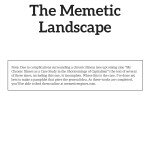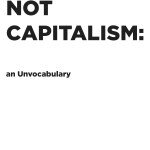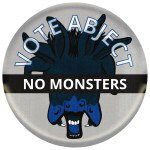Hey! In order to save on web hosting, I’ve migrated the content of the website for my Hampshire College Divison III project, “Memetic Engines of Anticapitalism,” to a page on my Squarespace site.
The big downside is that I can’t set up a different aesthetic for this page than the rest of my website. Apart from that, this is the same stuff.
Memetic Engines of Anticapitalism
At my gallery show for this project, I covered one of the walls in text and tape, diagramming the basic premises of my work. This was a fantastic way to contextualize the works in meatspace. It works horribly for the internet, though. Unfortunately I haven’t yet solved the problem of how to better contextualize this work on web media. I’m working on it, but in the meantime, here’s what I’ve got.
You can check out what the wall looked like in this diagram:
The text that was up on the wall is right here, since large horizontal images aren’t great for reading on the internet.
Memetic Engines of Anticapitalism (the wall of text)
Memetics is the study of how ideas grow and spread, from the perspective of evolutionary science.
Evolution describes the process and consequences of random mutation and nonrandom selection among replicators.
Many argue that these principles can apply to anything that replicates, not just organic material.
Memetics argues that these principles can apply to ideas.
Biological evolution produces incomprehensibly complex environments, full of interdependency, parasitism, and growth.
Memetic evolution produces the same thing. The memetic environment exists in our minds, our documents, our technologies, our built environment, and our art.
For the purposes of this exhibition, let’s define “Engineering” as “applying and combining conceptual principles to accomplish a difficult task,” and say that the products of this practice are “engines.”
Memetic engineering is common, even impossible to avoid. Advertising is a form of memetic engineering, as is propaganda, political speeches, standard curricula — every organized effort to control the information people receive and how they feel about it.
Memetics is a constant process, not just a strategy. We can’t escape it, and while it feels uncomfortable to make use of it, it’s what our enemies do. It’s what our enemies are.
So we need it. But we need to use it thoughtfully, because when groups routinely compromise to defeat a dominant enemy, they converge on adopting the qualities of that enemy, and often become just another version of the problem they formed to fight.
It’s easiest to think about the smallest forms of evolution in memetics, like how music genres shift and flow over time, musicians experimenting with (mutating) the style and fans supporting (selecting) some of those changes.
But there are things, made of ideas, that are much more complicated – even complicated enough that no human could hold the whole collection of ideas in their head at once.
One such kind of entity has come to dominate the decision-making about how the materials of the Earth are distributed. This non-human locus of decision-making is what I take to be the defining feature of capitalism. I call this entity “M. Corporis Pactum” (Memetic Body by Contract).
Pacta (plural of “pactum”) don’t have philosophy or ethics. They aren’t thinking things. They’re animals in the memetic wild. (Maybe they can be domesticated?) The only goals of a pactum are comfort and survival.
Acknowledging the primacy of pacta, not humans, in capitalism reveals a number of new vectors for attack against these systems.
We can exploit these vulnerabilities using memetic perspectives and engineering.
First: We can understand those individual humans who wield power not as antagonists but as complicit, held in position by the threat of pain. That makes them potential allies.
Second: With these mechanics in mind, clever people will be able to frankenstein together pacta with qualities heretofore unseen, and identify what kinds of things fall in the pacta’s blind spots, but remain clear and visible to humans.
Third: This perspective illuminates why some of the best strategies we already have are effective in dampening capitalism’s violence: coöperatives; unions; and organized, targeted, well-timed strikes and boycotts.
Abject 2032
Capitalism has many large-scale institutions and communities that act to promote its supporting premises. For example, at present both major political parties in the U.S. promote neoliberal capitalism, and although there are significant differences between them neither is structurally equipped to take up a critique of capitalism. So, though memetic interventions necessarily start at the smallest possible scale – that of the individual – some will necessarily need to reach a much larger and more organized scope in order to have meaningful effects.
“Abjection” refers to the type of fear that follows exposure to something that was once a part of a whole, and has now been severed from it. The Abjectionist Party is a fictional political party that ran as a prominent third party option in the 2032 United States elections. Its platform is organized around raising the concept of abjection as a core aspect of American political life.
The party argues that the United States government is abject: it’s a thing that was created by humans, and is comprised of humans, but neither is human nor serves human interests.
Both as a matter of human decency and in the face of an economic system buckling under the consequences of automation and climate change, the Abjectionist Party promotes policies that unconditionally support the life, autonomy, and dignity of all people. Often these policies emphasize “abject America” – those living in extreme poverty, or who are punished by systematic institutional and social discrimination.
Memetically, the party also aims to introduce into public discourse the notion of “abject wealth” – an inversion of the notion of abject poverty. It’s an effort to draw a distinction between the merely very wealthy and those who have access to such vast wealth that their experience of life is categorically dissociated from the experiences of Americans.
ABJECT 2032 was a museum-style installation, depicting the Abjectionist Party and their 2032 push for mainstream acknowledgment in US politics as a historical event. Below are pieces from that installation, and the accompanying diagetic text.
“Inhuman Ones” speech
Llewyn Goss delivered this speech at a campaign rally outside Boston on March 2, 2032, to an audience of 60,000 supporters. This speech is often cited as the first moment when the Abjectionist Party genuinely threatened Establishment candidates in high office positions, supporters emphasizing that there was no substantial backlash to ideas that were previously described as “third-rail policies,” guaranteed to kill a political career.
Critics have noted that Goss avoids referring to the audience as “Americans,” suggesting that this reflects a damning absence of national pride. However, emphasis on the humanity of constituents has been a central part of the Abjectionist platform throughout its existence, and “Fellow Humans” was already a standard introduction at the time of Goss’s speech.
No Monsters
The “No Monsters” campaign originated with a hashtag that had nothing directly to do with the Election Cycle or the Abjectionist Party. It started with a discussion of the monstrous behavior of America’s corporate elite, and the images of the Democratic and Republican animal symbols as Eldritch Horrors were made and posted by 19 year-old artist Abigail Scott.
Rotem Bernstein, manager for the Goss campaign, reached out to Scott, and hired her as a campaign artist. The campaign paid her a licensing fee for the original artwork, and offered her a salaried position to create campaign materials, for which she explicitly retained copyright.
In an interview about the “No Monsters” campaign, Bernstein told Time Magazine “She knew more about how artists have been exploited by politicians than we did. We were happy to oblige with her requests and are grateful for her self-advocacy, because we would have slipped into the same default policies that are bad for artists that every other campaign uses.”
severed hand
The word “Abjection” refers to the fear that people feel specifically when they face something that was once a part of a whole, and has now been severed from it. The Abjectionist party logo, a severed hand, evokes that fear at its most basic formulation.
“Conventional political symbols aim to be reassuring, and we feel that’s the wrong response to the state of America today,” said Lee, an organizer for the Abjectionist Party in the greater Boston area, in a 2027 interview with CNN.
The hand is orange, usually displayed against a green background, representing the Party’s stance with respect to the Red and Blue of the major U.S. political parties. Rather than purple, the synthesis of the two identities, the Abjectionist color scheme approaches both colors by way of their analogue with yellow.
Human Soul Exchange
In January 2018, shares of ownership in my immortal soul were made available for preorder. They were printed in April, and as of writing several have been purchased and delivered. 1,000 shares were initially made available at $45 each. The shares do signify ownership of a literal fraction of my immortal soul, but more importantly they each come with a certificate: a signed and numbered limited-edition print.
Like a company publicly offering shares of ownership to raise money for the cost of doing business, I’m offering shares of ownership in my soul to raise money to pay off my student debt. If I sell all 1,000 shares before my subsidized loans begin accumulating interest, I can enter postgraduate life debt-free.
And like investors in a conventional business, owners of shares in my soul can look forward to a potential increase in value: as my profile as a creator rises over time, the resale value of my early works will increase. And at a starting point of $45, there’s a lot of room for the value of that investment to go up.
Hell, this could be like getting in on Bitcoin in 2012. Much like Bitcoin, there are only ever going to be so many — the more people want one, the more they’re worth, and once the first 1000 are gone, I don’t care how much you sell them back to other people for.
§
Corporate personhood is a contentious idea in leftist spheres. Although the term has only captured public attention for about a decade (surrounding the 2010 Supreme Court decision Citizens United vs. FEC), the “Incorporation” of a company has always meant creating the organization as a unique person in the eyes of the law.
“Corporation” has always meant “person,” and increasingly each (human) person is pressured to act like their own corporation.
I was still a teenager the first time I remember being told that I need to think about my “brand.”
If they’re entitled to human rights, then I’m entitled to theirs too, right?
My effort to sell my soul has been covered in the Valley Advocate, in print and on their podcast.
You can buy a share (or as many as you’d like) right here at txwatson.com/my-soul
Image borrowed from Goulet Pens.
A note on the ink
I use Diamine Ancient Copper fountain pen ink to sign, number, and fingerprint these certificates. This ink does look very much like blood. There is, emphatically, no blood on these certificates. There are no bodily fluids of any kind deliberately incorporated into the works.
My debt, and student debt generally
I rounded up the price of the shares from $44.48 to $45, so that the math would be very easy: 45 dollars a share times 1000 shares equals $45,000 of debt. For me, that breaks down like this:
About $30,500 of that is my federal student loans, subsidized and unsubsidized. I’ve been very lucky that I only had to take out federal student loans to cover what I owe my school.
About $7,000 is other debt that I’ve accumulated in my effort to survive as a student. I haven’t been able to work full time during school, so between paying for food, medicine, and supplies, my credit debts have slowly drifted upwards. I’ve also had a couple big expenses that I needed to purchase on credit: like, my laptop completely died around the end of the Spring 2017 semester, and I had to very quickly replace it with something that met my technical needs.
About $500 is the printing cost of the certificates themselves, and the costs of the ink and pen nibs.
As best I could work out, if I sell these all within this year, I can anticipate about $6,000 in taxes on that income.
This all doesn’t account for the fact that if I do make all these sales then I’ll wind up having the rest of my subsistence-level income taxed at the third tax bracket, 22 percent, but I believe that I’d be in a better place dealing with heavy taxes for one year than with student debt for the rest of my life.
§
My debt is actually not that bad: it’s a little under the national average for undergraduate students. I attend Hampshire College, a privately owned liberal arts school that has a reputation for being overly expensive, but it actually has really fantastic financial support for people coming from a background of poverty. Students graduating from Hampshire have an average debt lower than those graduating from UMass Amherst, the state school right down the street.
I also went to a community college for four and a half years, taking two or three classes at a time to avoid starting to rack up a debt. And I did great there, and I got a big transfer scholarship from Phi Theta Kappa, the community college honors society. And I picked a college that’s in the top 1 percent for students going on to get the highest degrees in their fields.
What I’m trying to say is, insofar as poor people can do anything right, I’ve done everything right. This gigantic fucking pile of debt I’m staring at isn’t because of some shitty decision I made. It’s because every decision that’s been available to me has shitty outcomes. Student debt is a systemic problem, not a personal one.
Frankly, selling my soul has some potentially really shitty outcomes, too. But in the spirit of capitalism, I’m externalizing the costs of this life into the next. And I’m asking you, in the spirit of irony, to seize this opportunity to leverage the desperation of my poverty for a chance at personal gain. Lord knows someone else will if you don’t.
Full text of the certificate
Human Soul Exchange
This document certifies that its bearer owns 1/1000 of the Immortal Soul of Mx. T.X. Watson.
[signed] T.X. Watson
[numbered] of 1000
i. This certificate is legal tender for all debts of a metaphysical, ‘pataphysical, supernatural, or cosmic nature.
ii. T.X. Watson (hereafter “the Commodity”) commits the Commodity’s Immortal Soul, in parts numbering one thousand, to all markets, metaphysical, ‘pataphysical, supernatural, or cosmic, except where prohibited (see §v.).
iii. Possession of any fraction of the Commodity’s Immortal Soul is transferable by physical possession of this certificate.
The right of possession over this certificate is not protected from theft, fraud, deceit, or otherwise bad-faith interactions.
iv. Though the Commodity does not adhere to any supernatural, metaphysical, or cosmic revelation, the Commodity commits this certificate to record on faith that any fair-minded extramaterial being will interpret this certificate as valid within any framework relevant to that being’s understanding of reality.
Though the Commodity’s name as recognized by the Commodity’s sovereign state is not represented on this document, the Commodity commits this certificate to record on faith that any fair-minded extramaterial being will interpret this certificate as referring to the soul, or any part thereof, of that human who deliberately and without coercion volunteered the Commodity’s soul, or any part thereof, for commodification.
v. Destruction or radical transmutation of this certificate constitutes the remit of possession over the Commodity’s soul, or any part thereof, to the Commodity.
Transporting this certificate into any sovereign space wherein this certificate and the transaction it represents is prohibited constitutes the remit of possession over the Commodity’s soul, or any part thereof, to the Commodity.
The devaluing of this certificate does not entitle its bearer to compensation, material or metaphysical.
vi. Possession of this certificate does not empower its bearer to exercise control of any kind over the Commodity’s choices or actions, moral or otherwise, mortal or otherwise.
Zines
Printable PDFs of the zines from the wall:





















